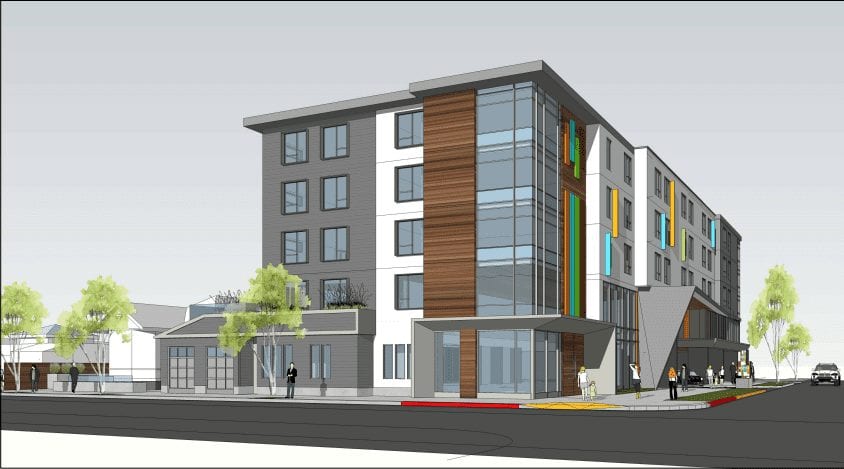San Jose lawmakers on Tuesday unanimously rejected a proposal to build a new hotel with two entertainment venues in a sleepy suburb of the city, following immense pressure from residents who voiced opposition to the project.
The hotel, which would have been located at 615 and 623 Stockton Ave., was heavily protested for being plopped in the middle of a historic neighborhood in the Alameda Gardens, incorporating a design that would’ve up-zoned a residential corridor lined with old, Victorian homes and California bungalows into a modern, urban commercial street.
Planning officials recommended demolishing the existing vacant 4,400-square foot commercial building, and re-locating and re-purposing an existing historic 1,292-square foot house on that block to construct the 120-room, five-story hotel.
But more than a dozen neighbors in this predominantly residential community stormed the council meeting Tuesday night, riled up over concerns about exacerbating traffic and noise in their corner of the city, and constructing a hotel that doesn’t fit in with the neighborhood’s character.
The hotly-contested proposal was brought to the City Council on Tuesday after the city’s planning commission narrowly approved the project by a 4-3 vote nearly two weeks ago. Several neighbors who spoke at the meeting rejected the proposal, adding that the land should be used for housing — instead of a hotel.
“Do our voices not matter, all the voices of the 50 people who showed up for the community meeting, all the voices of my neighbors who have sent emails and letters… and all the voices of my neighbors here tonight?” said resident Linda Tugatti. “I would like to leave these chambers knowing that our voices do matter.”


In city documents, the applicant, Infinite Investment Realty Corporation, said the hotel would bring new economic opportunity to a corner of San Jose that lacks substantial commercial activity. The architect firm defended the project during the meeting, saying the hotel would be a positive addition to the neighborhood. Residents responded with groans and boos.
“The design has evolved in significant ways, as we’ve engaged with the neighbors and took their concerns into account,” said Cory Creath, Principal Architect of San Francisco’s AXIS/GFA Architecture firm.
But Mayor Sam Liccardo said the developer failed to reach out to Councilmember Dev Davis, whose district the hotel is in, and her constituents in District 6.
“I really don’t understand the lack of outreach to the community or to the council office, ” Liccardo said. “I would have been receptive to hotel use if it was something that was better integrated in the neighborhood. I don’t think this one is.”
Davis added that while she often encourages development, a hotel that size would be better suited in the nearby Alameda Urban Village where density is encouraged. “I normally support smart development, especially when it’s a tax-producing project,” Davis said. “But we also need to preserve the neighborhood character.”
Wage theft policy
Councilmembers on Tuesday voted 10-1 to expand the city’s wage theft prevention policy to private construction companies.
Councilmember Johnny Khamis was the lone dissenting vote, arguing that the city should not be taking on a responsibility that should be left up to state agencies to enforce.
“We seem to be delving into territories and trying to take on responsibilities that are not ours,” Khamis said. “This is the state’s responsibility. The county already has an office to deal with it, so why do we need yet another duplicative service? I think that we should ask them to do their job and walk away from this and take care of our own projects.”
Nearly a year ago, the City Council unanimously approved applying the city’s wage theft policy to the construction industry and private development, a move prompted by the Silvery Towers scandal that rocked the city after subcontractor Job Torres Hernandez was found harboring undocumented immigrants in slave-like conditions hired to work for the city-subsidized project.
City officials are in the midst of formalizing a draft policy that ensures construction workers are adequately paid. These measures include developing “cooperative relationships” with regional enforcement agencies to “secure access to data and better support San Jose workers.”
“I remember being a victim of of wage theft myself,” Councilmember Magdalena Carrasco said. “You didn’t defend yourself, you were just very grateful to have a job and so we’re here in a very privileged position to be able to defend individuals who should be paid so they can stay here in San Jose.”
Carrasco and Councilmembers Sergio Jimenez and Raul Peralez asked city officials to take an extra step to define “chronic bad actors” that would be immediately disqualified as potential contractors for the city, based on past wage theft violations.
The new policy will be implemented across all city departments. City officials will return to the City Council with a draft policy in the spring.
Funding for homeless prevention
Also Tuesday, lawmakers approved the city’s application and spending plan for a one-time $23.8 million grant for a state-approved homelessness prevention program.
Gov. Gavin Newsom signed the Homeless Housing, Assistance and Prevention (HHAP) program into law last July, which went into effect in January. The program is a $650 billion block grant that provides California cities and counties with funds to support “regional coordination” to expand and develop strategies to tackle homelessness.
Housing officials plan to use the money to support their five-year homelessness strategic plan, which includes plans to build navigation centers and emergency shelters, among other measures.
The City Council also approved exploring the idea of “safe storage” solutions for unsheltered residents’ items as well as increased services for the homeless around navigation centers.
Contact Nadia Lopez at [email protected] or follow @n_llopez on Twitter.



Leave a Reply
You must be logged in to post a comment.